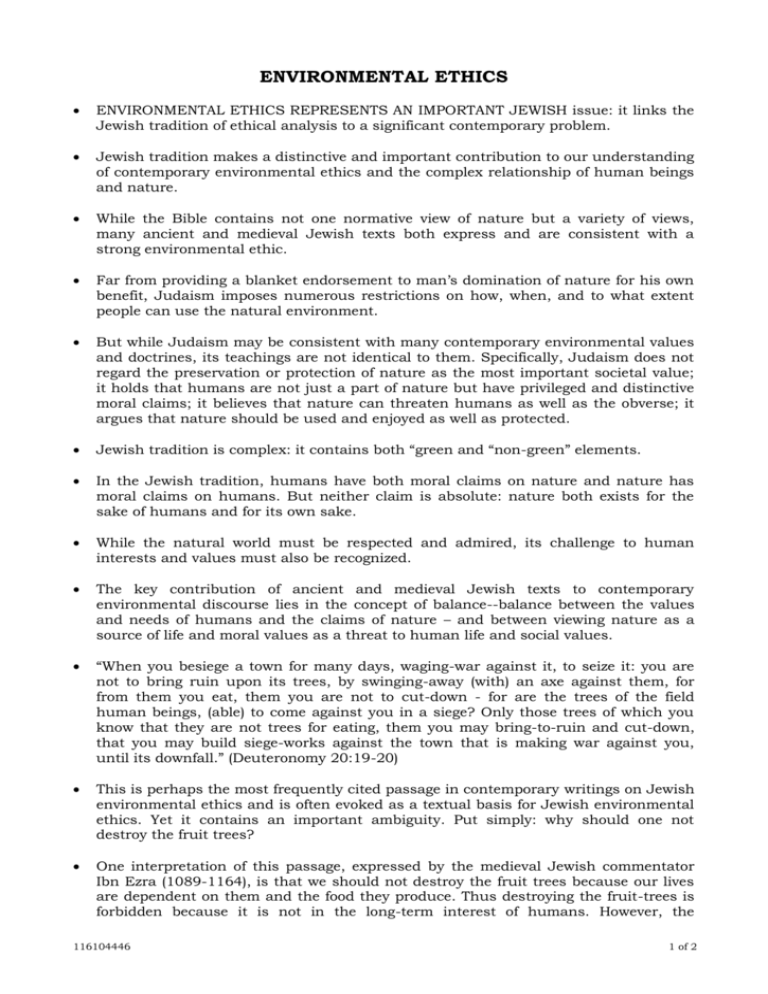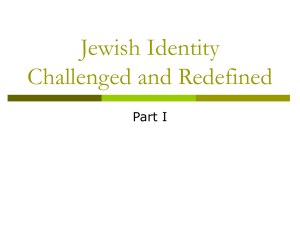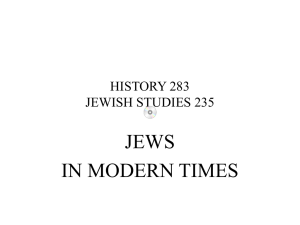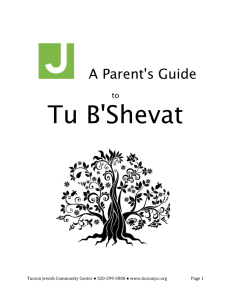Environmental Ethics
advertisement

ENVIRONMENTAL ETHICS ENVIRONMENTAL ETHICS REPRESENTS AN IMPORTANT JEWISH issue: it links the Jewish tradition of ethical analysis to a significant contemporary problem. Jewish tradition makes a distinctive and important contribution to our understanding of contemporary environmental ethics and the complex relationship of human beings and nature. While the Bible contains not one normative view of nature but a variety of views, many ancient and medieval Jewish texts both express and are consistent with a strong environmental ethic. Far from providing a blanket endorsement to man’s domination of nature for his own benefit, Judaism imposes numerous restrictions on how, when, and to what extent people can use the natural environment. But while Judaism may be consistent with many contemporary environmental values and doctrines, its teachings are not identical to them. Specifically, Judaism does not regard the preservation or protection of nature as the most important societal value; it holds that humans are not just a part of nature but have privileged and distinctive moral claims; it believes that nature can threaten humans as well as the obverse; it argues that nature should be used and enjoyed as well as protected. Jewish tradition is complex: it contains both “green and “non-green” elements. In the Jewish tradition, humans have both moral claims on nature and nature has moral claims on humans. But neither claim is absolute: nature both exists for the sake of humans and for its own sake. While the natural world must be respected and admired, its challenge to human interests and values must also be recognized. The key contribution of ancient and medieval Jewish texts to contemporary environmental discourse lies in the concept of balance--balance between the values and needs of humans and the claims of nature – and between viewing nature as a source of life and moral values as a threat to human life and social values. “When you besiege a town for many days, waging-war against it, to seize it: you are not to bring ruin upon its trees, by swinging-away (with) an axe against them, for from them you eat, them you are not to cut-down - for are the trees of the field human beings, (able) to come against you in a siege? Only those trees of which you know that they are not trees for eating, them you may bring-to-ruin and cut-down, that you may build siege-works against the town that is making war against you, until its downfall.” (Deuteronomy 20:19-20) This is perhaps the most frequently cited passage in contemporary writings on Jewish environmental ethics and is often evoked as a textual basis for Jewish environmental ethics. Yet it contains an important ambiguity. Put simply: why should one not destroy the fruit trees? One interpretation of this passage, expressed by the medieval Jewish commentator Ibn Ezra (1089-1164), is that we should not destroy the fruit trees because our lives are dependent on them and the food they produce. Thus destroying the fruit-trees is forbidden because it is not in the long-term interest of humans. However, the 116104446 1 of 2 medieval Jewish scholar Rashi (1040-1105), offers a rather different interpretation. He asks rhetorically: “Are trees like people that they can run away from an advancing army and take refuge in the town? Of course not – they are innocent bystanders. Therefore don’t involve them in your conflicts, and don’t cut them down.” In short, the trees have a life of their own: they don’t just exist to serve human needs. Ibn Izra’s interpretation evokes the concept of sustainable development: we are permitted to pick the fruit, but not destroy the fruit tree because the fruit is a renewable resource while the tree presumably is not. Rashi’s interpretation is ecocentric or bi-ocentric: it makes no reference to human needs. It posits that trees have an intrinsic value which is independent of human welfare or concerns. Not only can one locate both perspectives within Jewish tradition but the very ambiguity of Deuteronomy 20:19-20 contains an important key to understanding the Jewish approach to environmental ethics. The diverse interpretations of this passage suggest that Jewish environmental ethics incorporates both anthropocentrism and bio-centrism. To argue that nature exists only for the benefit of man is to refuse to acknowledge all nature as God’s creation. But it would be equally misguided to claim that humans ought not use nature for their own benefit. Clearly God does not want us to live in a world in which we are forbidden to chop down all trees, since such a prohibition would make the preservation and sustaining of human life impossible. At the same time, neither does God want us to assume that the entire natural world exists to satisfy our material needs, for as Psalm 24 reminds us: “The earth is the Lord’s and all that is in it.” The Torah’s distinction between fruitbearing and non-fruit-bearing trees seems to suggest both ideas: nature exists both for the benefit of humans and has a value which is independent of human needs. “When you encounter the nest of a bird before you in the way, in any tree or on the ground, (whether) fledglings or eggs, with the mother crouching upon the fledging or upon the eggs, you are not to take away the mother along with the children. Sendfree, send-free the mother, but the children you may take for yourself, in order it may go-well with you and you may prolong (your) life.” Once again: why should one take the young but let the mother go? According to Don Isaac Abravanel (1437-1508), “God has commanded us not to destroy that which generates progeny,” adding that “this commandment is given not for the sake of the animal world but rather so that it shall be good for humankind when Creation is perpetuated so that one will be able to partake of it again in the future.” To translate this interpretation into a modem idiom, Abravanel has invoked the concept of sustainable development. Nahmanides (1194-1270), another medieval commentator, views this commandment in terms of an eco-centric understanding of the value of species preservation. According to his interpretation of this passage, “Scripture will not permit a destructive act that will bring about the extinction of a species, even though it has permitted the ritual slaughtering of that species for food. He who kills the mother and offspring on one day is considered as if he destroyed the species.” Thus according to Nahmanides, species extinction is intrinsically wrong-regardless of how or whether it affects humans 116104446 2 of 2







